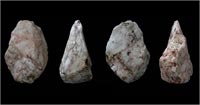 Here is an intriguing article suggesting that we humans have been taking to the sea for far longer than had been previously recorded. Recently stone tools have been found on the island of Crete which date back at least 130,000 years and may be much older. As Crete has been an island for more than five million years, this suggests that those who carried the tools to the island were very ancient mariners indeed. Thanks to John for passing the article along.
Here is an intriguing article suggesting that we humans have been taking to the sea for far longer than had been previously recorded. Recently stone tools have been found on the island of Crete which date back at least 130,000 years and may be much older. As Crete has been an island for more than five million years, this suggests that those who carried the tools to the island were very ancient mariners indeed. Thanks to John for passing the article along.
On Crete, New Evidence of Very Ancient Mariners
The oldest established early marine travel anywhere was the sea-crossing migration of anatomically modern Homo sapiens to Australia, beginning about 60,000 years ago. There is also a suggestive trickle of evidence, notably the skeletons and artifacts on the Indonesian island of Flores, of more ancient hominids making their way by water to new habitats.
Even more intriguing, the archaeologists who found the tools on Crete noted that the style of the hand axes suggested that they could be up to 700,000 years old. That may be a stretch, they conceded, but the tools resemble artifacts from the stone technology known as Acheulean, which originated with prehuman populations in Africa.
More than 2,000 stone artifacts, including the hand axes, were collected on the southwestern shore of Crete, near the town of Plakias, by a team led by Thomas F. Strasser and Eleni Panagopoulou. She is with the Greek Ministry of Culture and he is an associate professor of art history at Providence College in Rhode Island. They were assisted by Greek and American geologists and archaeologists, including Curtis Runnels of Boston University.

Pingback: Ancients Seafarers & Crete, What Again? : Old Salt Blog – a virtual port of call for all those who love the sea
Pingback: The Really, Really Ancient Mariners – Solutreans, Neanderthals & Hobbits | Old Salt Blog – a virtual port of call for all those who love the sea